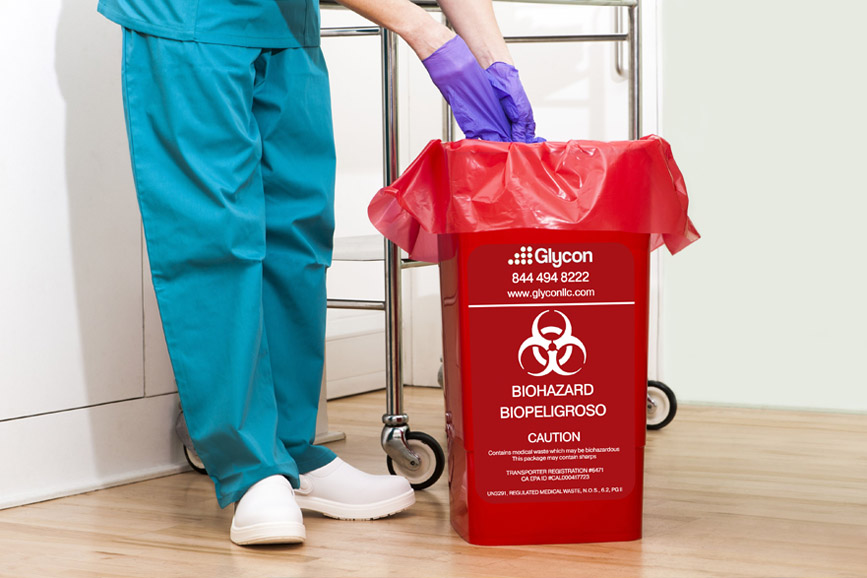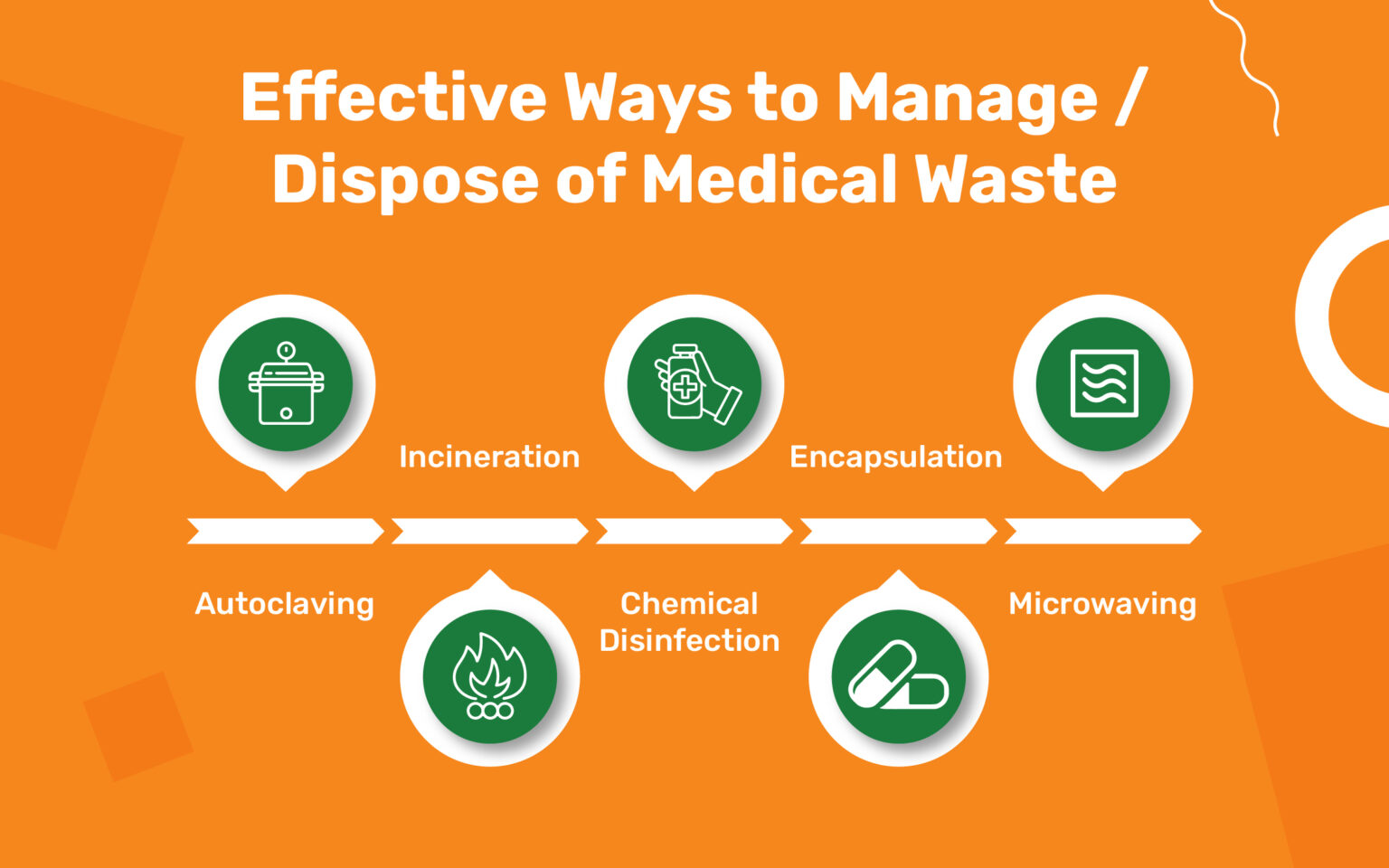Your Relied On Companion: Medical Waste Removal Services Tailored to Your Demands
Your Relied On Companion: Medical Waste Removal Services Tailored to Your Demands
Blog Article
Stay Ahead of Regulations: Expert Suggestions on Medical Waste Disposal
In a globe where the medical care industry is continuously evolving, it is critical for clinical centers to remain ahead of regulations when it comes to the appropriate disposal of clinical waste. From recognizing the different classifications of medical waste to applying the ideal collection and segregation approaches, this conversation will certainly offer beneficial understandings and workable suggestions to assist centers remain ahead of policies in the ever-changing landscape of medical waste disposal.
Comprehending Clinical Waste Categories
Recognizing clinical waste categories is important for appropriate disposal and monitoring in health care facilities. Clinical waste describes any kind of waste produced by healthcare tasks that may posture a hazard to public health or the environment. It is vital to categorize clinical waste accurately to guarantee its safe handling, disposal, treatment, and transportation.
There are numerous categories of clinical waste that medical care centers need to be accustomed to. The most usual groups include infectious waste, pathological waste, sharps waste, pharmaceutical waste, and chemical waste. Each classification has certain standards and regulations for its proper administration and disposal.
Pathological waste refers to human tissues, organs, or body components that call for unique handling and disposal. Pharmaceutical waste comprises expired, extra, or infected medications that need careful handling and disposal.
Staying Up-To-Date With Regulatory Changes
Remaining existing with regulative modifications is important for health care facilities to ensure conformity and appropriate management of medical garbage disposal. medical waste removal service. With regulations frequently advancing, it is necessary for health care centers to remain up-to-date to stay clear of charges, fines, and possible damage to the environment and public wellness
To stay in advance of regulative changes, health care facilities need to develop a system for tracking and monitoring updates. This can be done by signing up for regulatory e-newsletters, attending workshops and seminars, and actively getting involved in industry organizations. Additionally, centers should assign a staff member or group in charge of remaining informed and distributing details to appropriate stakeholders.
Normal communication with regulative firms is also essential. Health care centers should establish partnerships with local, state, and government firms to ensure they know any kind of changes in guidelines that might impact their waste administration techniques. This can be done via regular meetings, involvement in public remark periods, and proactive interaction with governing firms.
Furthermore, health care centers ought to consider partnering with waste administration firms that focus on clinical waste disposal (medical waste disposal services with WasteX). These companies are typically fluent in the latest policies and can offer support and assistance to make certain conformity
Implementing Proper Collection and Segregation Methods
To successfully handle medical waste disposal, health care facilities need to establish appropriate collection and segregation methods according to regulatory guidelines. Implementing these methods ensures the secure handling and disposal of possibly unsafe products, secures the atmosphere, and reduces the risk of infections and injuries to healthcare employees and the basic public.
Appropriate collection and segregation methods entail using assigned containers and identifying systems. Healthcare centers must supply clearly labeled containers for various kinds of medical waste, such as sharps, transmittable waste, pharmaceutical waste, and non-hazardous waste. These containers must be color-coded and clearly marked to stay clear of complication and advertise simple identification.
In addition, health care facilities need to educate their staff on the correct treatments for collecting and setting apart medical waste. This includes informing them on the different kinds of waste, the proper containers to use, and the relevance of complying with guidelines and guidelines. Regular training sessions and refresher course programs need to be carried out to ensure that team member continue to be current on ideal methods.
Additionally, medical care facilities need to establish a system for normal collection and disposal of medical waste. This might entail partnering with accredited waste monitoring business that concentrate on medical garbage disposal. These companies will make certain that the collected waste is moved and thrown away in conformity with regulatory demands.
Choosing the Right Disposal Methods

Incineration is one of the most typical and efficient techniques for throwing away particular kinds of clinical waste, such as pathological waste and sharps. It includes the regulated combustion of waste at heats, minimizing it to ash. Nevertheless, incineration can release damaging contaminants into the air and add to air pollution.

Chemical therapy entails the usage of chemicals to counteract the waste and decontaminate. Microwave therapy makes use of microwave power to heat and disinfect the waste.
Guaranteeing Compliance With Documentation and Training
After thoroughly thinking about the suitable disposal techniques for medical waste, healthcare centers have to make certain conformity with guidelines and lessen ecological effect by carrying out efficient paperwork and training procedures. This action is critical in keeping a risk-free and sustainable setting for both health care workers and the basic public.

Training is similarly crucial in ensuring compliance with policies. Health care employees that deal with medical waste should receive proper training on waste partition, taking care of, and disposal procedures. This training should cover topics such as the appropriate use individual protective equipment, identification of different kinds of waste, and the right disposal approaches for each and every waste group. By providing extensive training, health care facilities can equip their personnel to make educated decisions and minimize the risk of incorrect garbage disposal.
Final Thought
Finally, remaining in advance of policies in medical click this garbage disposal is critical for medical care centers. medical waste removal service. Recognizing the various groups of clinical waste, staying updated with regulatory adjustments, applying correct collection and partition techniques, choosing the appropriate disposal approaches, and ensuring compliance via documentation and training are all crucial steps. By adhering to these standards, healthcare organizations can properly take care of and dispose of medical waste in a secure and responsible fashion
From comprehending the different he has a good point classifications of medical waste to carrying out the right collection and partition methods, this conversation will give workable ideas and useful understandings to aid facilities remain in advance of regulations in the ever-changing landscape of medical waste disposal. - medical waste disposal services with WasteX
The most typical groups include infectious waste, pathological waste, sharps waste, pharmaceutical waste, and chemical waste. Healthcare facilities ought to offer clearly labeled containers for different types of medical waste, such as sharps, infectious waste, pharmaceutical waste, and non-hazardous waste. Healthcare centers should establish a thorough system to videotape and track all facets of clinical waste disposal, including kinds of waste produced, quantities, and disposal techniques utilized. Healthcare workers that take care of medical waste must get suitable training on waste segregation, dealing with, and disposal procedures.
Report this page